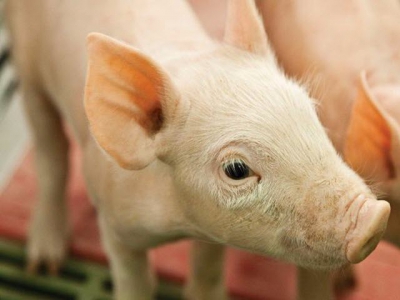Using feed acidifiers to improve nursery pig nutrition

Feed acidifiers have shown to be effective tools to help swine producers. DSM's VevoVitall is a tool that can help nursery pigs thrive.
Feed acidifiers have commonly been used in pig starter diets for decades. There are a wide variety of acids available for use in swine, with each having a range of different properties and characteristics.
But not all acids are created equal. Common forms include salt of an organic acid or a blend of organic acids (e.g. butyric, citric, fumaric, propionic, etc.). Diets can sometimes include an inorganic acid (e.g. phosphoric).
Feed acidifiers have shown variable results but have been more consistent when Spray-Dried Animal Plasma and other specialty ingredients began replacing higher levels of milk byproducts (i.e., dried skim milk).
One feed acidifier, benzoic acid, is a long-established preservative in the feed industry. Better feed preservation can help improve feed intake and performance.
VevoVitall, the newest benzoic acid
VevoVitall is a pure (≥99.9 percent) benzoic acid that was approved in 2014 for use in North American pig diets up to 0.5 percent. VevoVitall is a fully traceable ingredient with improved handling characteristics comparted to other organic acids, including low caking, less corrosive on processing equipment and it has a low odor.
VevoVitall has already been used predominantly in European regions of pig production for over 10 years in countries such as Denmark, Germany, Netherlands, Belgium, France, Spain and the UK.
How VevoVitall works
VevoVitall is included in the feed, where benefits begin with feed acidification. When pigs consume the feed, VevoVitall modulates the pH of the GI tract, resulting in:
- Increased nutrient digestibility
- Support of beneficial intestinal microflora
- Improved GI functionality
- Ultimately, VevoVitall is metabolized in the body and excreted predominantly as hippuric acid in the urine
- Can reduce the pH of urine, therefore reducing ammonia emissions
VevoVitall is proven to improve nursery pig performance
In Europe, good research and experiences with 0.5 percent dietary inclusion of VevoVitall compared to other acids/additives results in:
- Improved nutrient digestibility
- Improved nursery and growing pig performance (~6 percent ADG, ~3 percent ADFI, ~3 percent F/G)
- Feed preservation/hygiene
- Environmental benefits – reduced NH3 emissions from slurry
In practice, it is often used alone because “it’s the best single acid for pig feeds,” and is sometimes used in combinations with other acidifiers/additives.
In North America (since 2014), VevoVitall usage is continuing to increase. The benefits observed in the last 5 years of research include 10 research trials across university and commercial settings and show increased average daily gain of approximately 6 percent, and:
- Increased ADFI ~3%
- Improved F/G ~2.5%
- Increased ending BW ~3%
- Average ROI: ~2:1
Related news
 Wild pigs expand range in Canada
Wild pigs expand range in Canada A mix of wild boar and domesticated swine — are spreading rapidly across Canada, threatening native species such as nesting birds, deer, agricultural crops
 Investments in Vietnamese pig sector despite ASF challenge
Investments in Vietnamese pig sector despite ASF challenge Leading Chinese feed producer, New Hope Group, is planning to construct three pig farms in Vietnam, despite the threat from the African Swine Fever (ASF) virus
 Sows could benefit from novel oilseed cake tested in grower pigs
Sows could benefit from novel oilseed cake tested in grower pigs Swedish researchers looked at feeding a novel feed resource, Lepidium cake (LC), to grower pigs, saw that it was a palatable feed